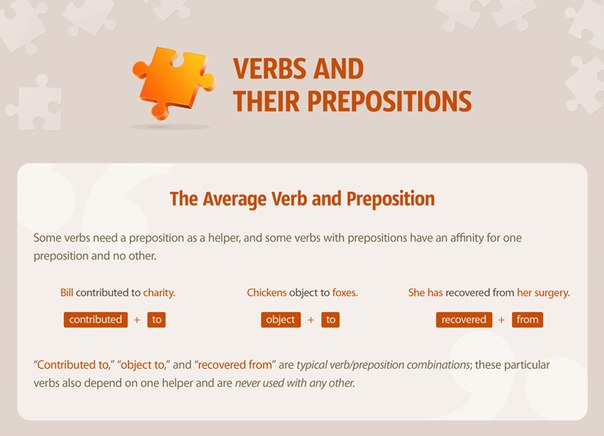
Some verbs need a preposition as a helper, and some verbs with prepositions have an affinity for one preposition and no other.
“Bill contributed to charity.”
“Chickens object to foxes.”
“She has recovered from her surgery.”
“Contributed to,” “object to,” and “recovered from” are typical verb/preposition combinations; these particular verbs also depend on one helper and are never used with any other. Sometimes, a happy couple has a word between them, but both words are always there.
“Bob blames Bill for spilling his coffee.”
“He accused him of being clumsy.”
“I enjoy separating verbs from their helpers because I am mean.”
Here is a list of ten interesting verb and preposition combinations.
1. Call In
One of the most maddening aspects of English is that some terms that seem opposite mean the same thing (“fat chance” and “slim chance” both mean there is no chance). Another is that some terms that seem similar have nothing to do with each other. Viewed together, “call in” and “call off” could give ESL students a headache. These examples use “call in,” but the meanings are different.
“Joe the policeman used his radio to call in a stolen vehicle.”
“Poor Margie was so sick that she had to call in to work.”
2. Call Off
These three seem different but the basic idea is similar: some sort of cancellation.
“Frankie feels ill and might call off from work.”
“The police found the escaped criminal and called off the dogs.”
“If the rain doesn’t stop, we may have to call off our picnic.”
3. Bowl Over
“The big dog accidentally bowled me over.”
“When I heard Phil was fired, it bowled me over.”
In the first example, the “bowling over” is literal; the second is a phrasal verb that refers to a state of shock or surprise.
4. Pay For
“‘You’ll pay for that, wise guy,’ the mafia man sneered.”
This phrasal verb is a cheesy threat.
5. Bear With
“I saw a bear with three cubs.”
“Please bear with Hannah, she is new here.”
The first refers to furry animals, the second is a phrasal verb that requests patience.
6. Hold Out
“The glasses were pretty, but Betty decided to hold out for a sale.”
This phrasal verb means that Betty is waiting for a sale.
7. Cool Down
“Fred went somewhere to cool down after the argument.”
Fred was angry, but this phrasal verb shows he has calmed down.
8. Eat Up
“The kids were eating up the festivities.”
A phrasal verb, this shows intense enjoyment.
9. Count On
“Can we count on you for the party?”
This phrasal verb is making sure you will definitely come to the party.
10. Drop By
“Drop by any time.”
Another phrasal verb; this common saying is used to invite casual visits.